Webster is Educational Member of Audio Engineering Society
Webster's student section of the Audio Engineering Society is one of the most active and successful chapters worldwide.
School of Communications
At the Department of Audio Aesthetics and Technology, we teach audio production students about music recording, audio engineering and sound design. With a hands-on approach, our audio production programs are the best in the area and allow undergraduate students to apply their talents beyond the classroom.
Through audio internships and externships, we are committed to providing students with an understanding of audio technologies and connections with top audio facilities around the country. We offer comprehensive programs that emphasize the theoretical basis of knowledge in conjunction with practical applications. We are a member of the Audio Engineering Society and the Broadcasters Educational Association.
Webster University's state-of-the art virtual cinema system and newly renovated facilities housed at the School of Communications were recently featured on Channel 9 PBS's "Living St. Louis." Students will apply their studies in audio theory, technology, sound recording principals to capture, record, mix and finalize audio on professional quality productions.
Our Virtual Cinema System allows students to create any environment they can imagine, enabling students enrolled in Webster's Sound Recording and Engineering (BS) to work collaboratively with production teams to build an aesthetic sound design and add to the overall success of a production.
The production facilities in the recently renovated Sverdrop complex boast professional level equipment and studios, such as an audio studio that features spherical sound, allowing you to experience your music and sound design in a fully immersive way.
[Bright music plays]
Text on screen: Webster University’s Virtual Cinema System, Arrival of a Train at La Ciotat, Lumiere No. 653
Channel 9 PBS logo shown in corner of screen throughout video.
[Students on stage with camera and video equipment. Black and white video footage of a train station with people standing near the tracks as the train pulls in.]
Brooke Butler: There's a well-known story in the world of cinema about an early film made by the Lumiere Brothers. Because the concept of film was so new, when “Arrival of a Train at La Ciotat” was shown to audiences for the first time, it was said that people ran out of the theatre in a frenzy for fear that the train would not stop and would plow right off the screen.
[Modern-day virtual cinema classroom showing a moving subway train on one wall with a group of students and faculty watching and talking.]
Text on screen: Living
Virtual Cinema System, 127 years later, the technological advancements of filmmaking have these students captivated by a train on a screen for much more complex reasons.
Eric Rothenbuhler: This is the first virtual cinema system in the St. Louis area and it's gotta be one of very few in an educational institution anywhere in the country.
[Rothenbuhler sitting inside the Sverdrup Technology Complex.]
Voices in campus classroom: Do you guys wanna try? You can put it on the camera.
[The crew] Sure.
Butler: This virtual cinema system utilizes advanced technology to create any setting or atmosphere and calibrates it to this LED studio wall as a soundstage. Basically, it allows a video to take place in any real or imaginary location.
[Students stand in front of a virtual reality background in a classroom.]
Text on screen: Eric Rothenbuhler, Dean, Webster University of School of Communications
Rothenbuhler: You can shoot a sunrise scene inside a soundstage all day long. You can shoot a rainy day indoors. You can shoot a sunny day indoors on a rainy day. It gives you complete freedom of production. You can also shoot actors in an imagined environment.
[A virtual reality background is shown with a person-shaped place holder.]
Rothenbuhler: You can invent environments and so on.
Butler: A major production to utilize this technology was “The Mandalorian,” in which over 50% of the first season was shot with a virtual cinema system.
[Images of a Stormtrooper action figure is shown from the “Star Wars” stories. A setting inside the classroom is changed into a virtual reality scene in the science fiction movie. Large pieces of equipment and props are shown.]
Butler: And while these film and video production majors at Webster University probably won't be creating something as large scale as that, this technology is a recently added feature to the major renovations of the School of Communication's production facilities.
[Several photos of classroom preparation and technical equipment being set up. A page from the School of Communications website is shown.]
Butler: So when I was in undergrad here, this was ... I'm lost right now. I don't even know where we are. The media center was this way. So what's happening here?
[Different angles and hallways of Sverdrup are shown as Rothenbuhler gives Butler a tour.]
Rothenbuhler: So this remodeling was a complete gutting of the building. So everything but the exterior envelope was demolished and pulled out and then reconstructed so that it could be purpose-built as a communication and media production facility.
[Footage of the building when it was gutted for the new construction. Imagery of a virtual scene setting inside a classroom.]
Butler: The Sverdrup Building was built in the 1980s before Webster even had a School of Communications.
[Various images and footage of the inside of Sverdrup before it was renovated.]
Butler: As the field grew exponentially, they built a small TV studio and fashioned classrooms into editing labs, dark rooms and a media center. So now through this remodeling process, students no longer have to squeeze into makeshift studios, but have access to more intentional production spaces.
[Various images of professors and students in classrooms, sound editing studios and working on other technical equipment.]
Butler: So technology has helped in a lot of ways. It's also raised the question, everyone with a phone is a filmmaker now. Everyone can go on YouTube and learn how to program a game. How has that affected enrollment?
Rothenbuhler: I believe one of the reasons we've seen growth, everybody wants to tell visual stories, and young people have more facility with visual stories than earlier generations did. But you may not be a master storyteller yet. We all speak English. That doesn't make us all bestselling novelists.
[More technical equipment is shown in various studios with Rothenbuhler showing it all and talking to Butler.]
Rothenbuhler: So we can take those native skills and shape them into professional skills. So this is an immersive sound system. There'll be 19 speakers in here. That creates a full 360-degree spherical sound field.
Butler: So all of this, just the process for this room, there's a lot of money in this room is what I'm saying. Do you see the return on investment happening?
Rothenbuhler: Absolutely. The facilities we're providing our students now mimic, they're designed architecturally and technically to mimic the kinds of workplaces they'll be moving into after they graduate.
[More classroom shots with students creating imagery and videos for cinema.]
Butler: Having these educational settings that resemble real industry workplaces especially makes sense with instruction from faculty members who continue to work in the industry.
Text on screen: Joshua Johnson, Assistant Professor, Webster University
Joshua Johnson: I'm still, even though I'm full-time teaching here, I'm still out there working. This past summer I worked on “Hocus Pocus 2.”
Text on screen: Juraj Bohus, Associate Professor, Webster University
Juraj Bohus: So now I'm working on a film which I have 3D actors.
Butler: Joshua Johnson and Juraj Bohus are co-teaching the first class utilizing the virtual cinema system.
[More classroom examples of virtual cinema settings are shown with students and professors talking and interacting.]
Butler: And while most film and video production classes don't rely on a textbook way of teaching, this class is particularly flexible.
Text on screen: Vincent Italiano, Student of Film, Television & Video Production
[Italiano shown talking to camera.]
Vincent Italiano: It's not like other programs where you have a selected curriculum and there's a bunch of tests you have to take and materials you have to cover. This is a process where everybody is learning, including the professors. It's completely experimental.
[Footage of Italiano working in a virtual cinema classroom.]
Italiano: My goals after I graduate I think are to get with some larger production houses with LED walls and visual effects and stuff like that.
Text on screen: Joshua Johnson, Assistant Professor, Webster University
Johnson: I think that's really important for students to have a professional, their professor, to actually be there still working in projects. Because as you can see, technology changes pretty quickly.
[Bohus shown talking while facing camera.]
Bohus: Things are kind of changing to the point where in the future it'll be very interesting to see like what is what. It's pretty uncanny.
Text on screen: Living St. Louis
Butler: For Living St. Louis, I’m Brooke Butler.
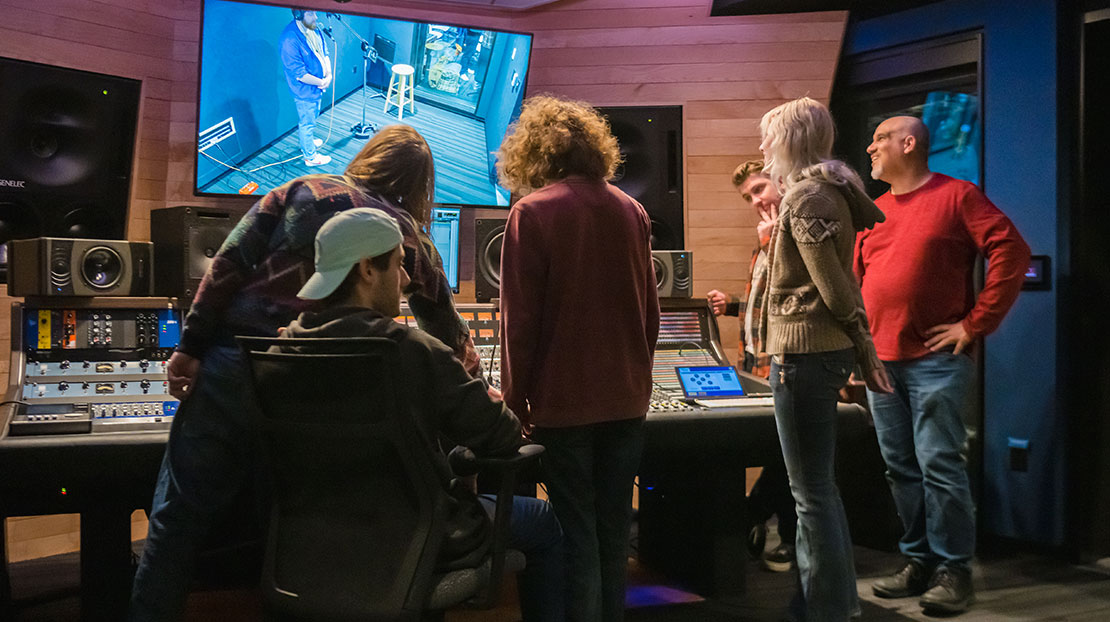
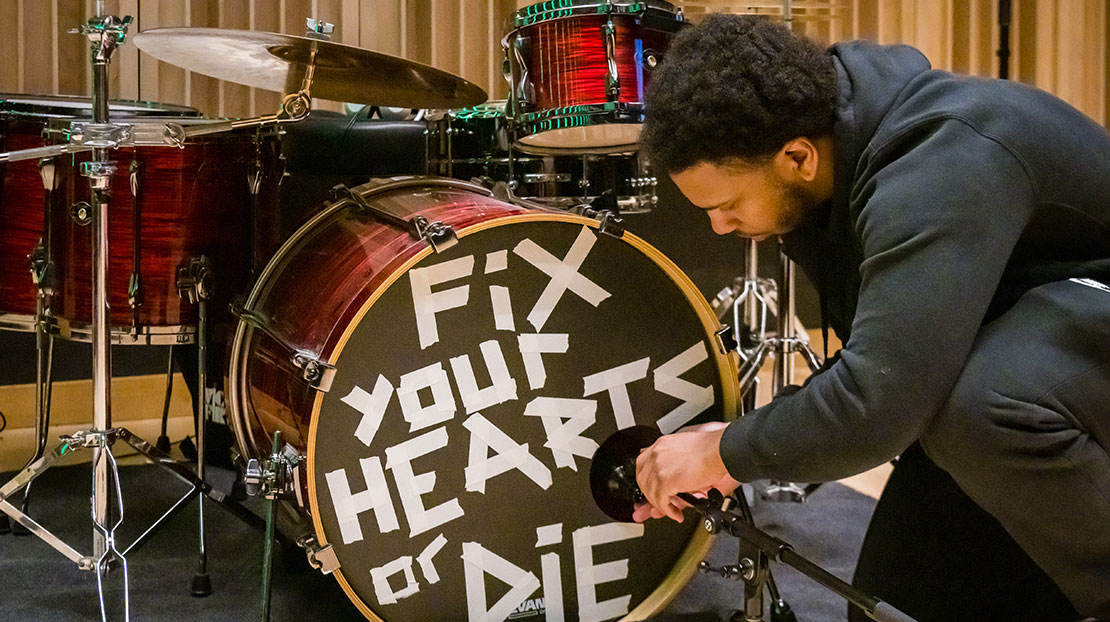
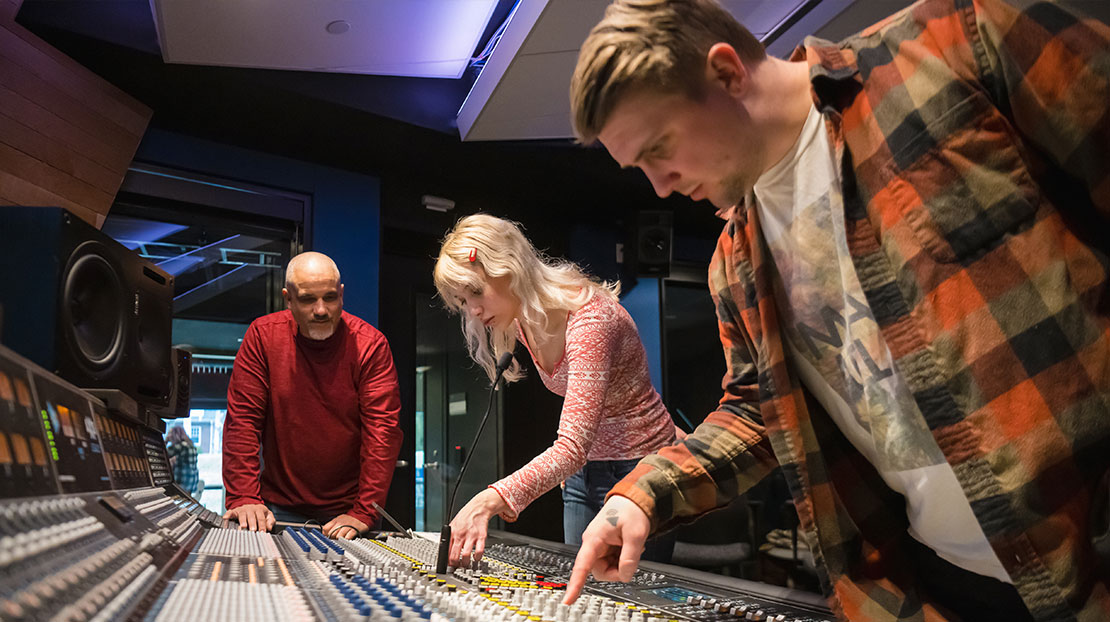
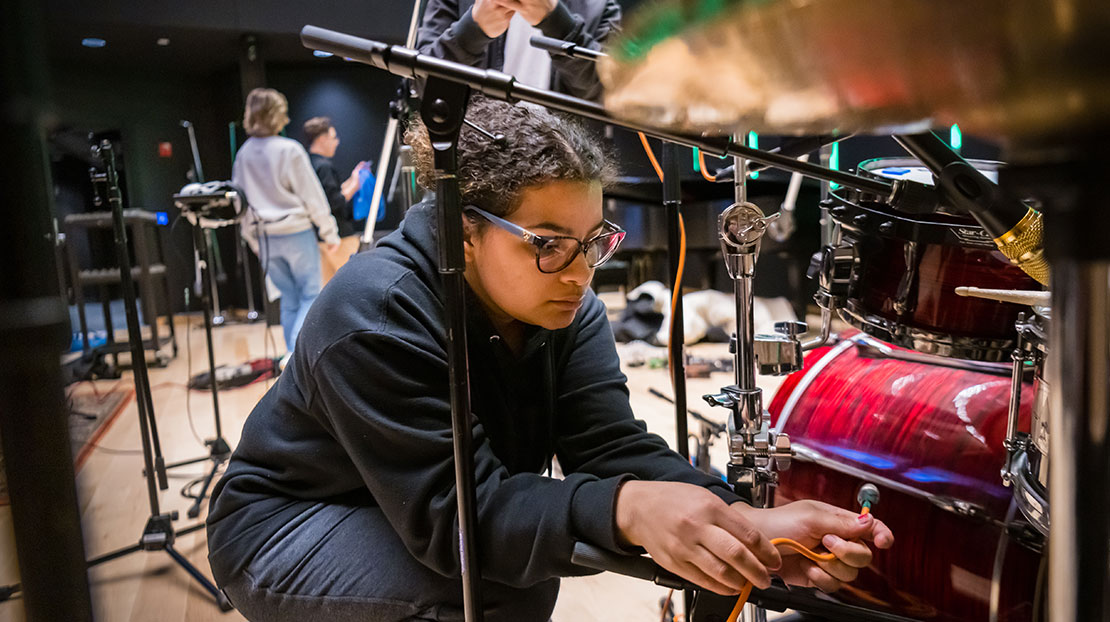
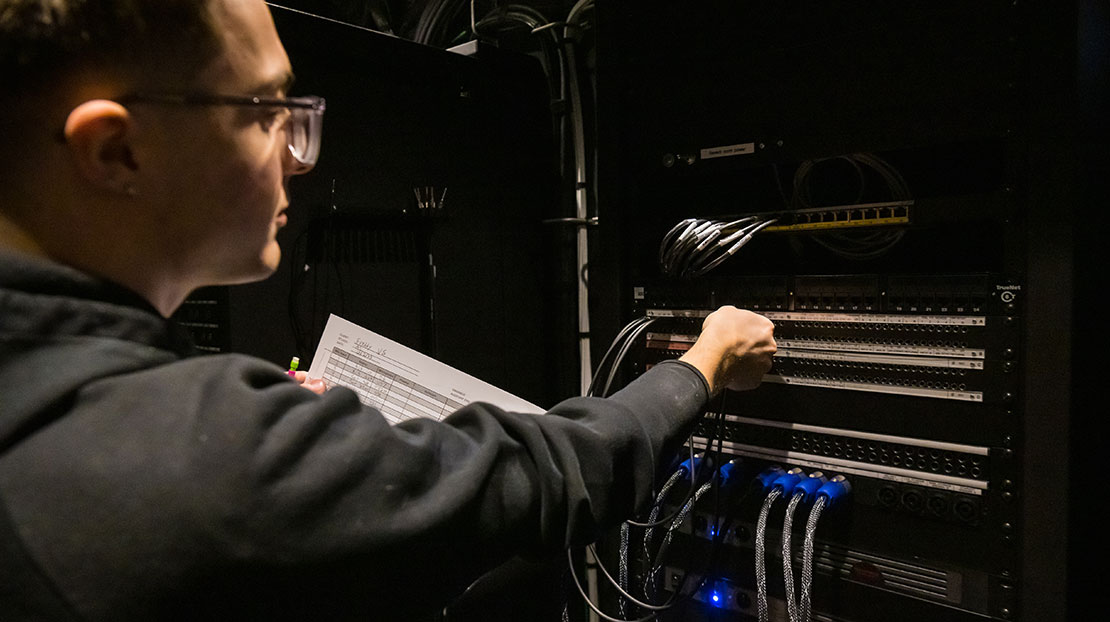
Webster's student section of the Audio Engineering Society is one of the most active and successful chapters worldwide.



BS in Sound Recording and Engineering, ’24
Learn About WebsterLEADS ProgramDiscover more about our relevant and hands-on curriculum across a variety of fields and disciplines.

Whether you're just getting started, are in the thick of a program or have graduated and are preparing for a professional career, we're here to guide you. Set up an appointment with us or check out our resources list below.
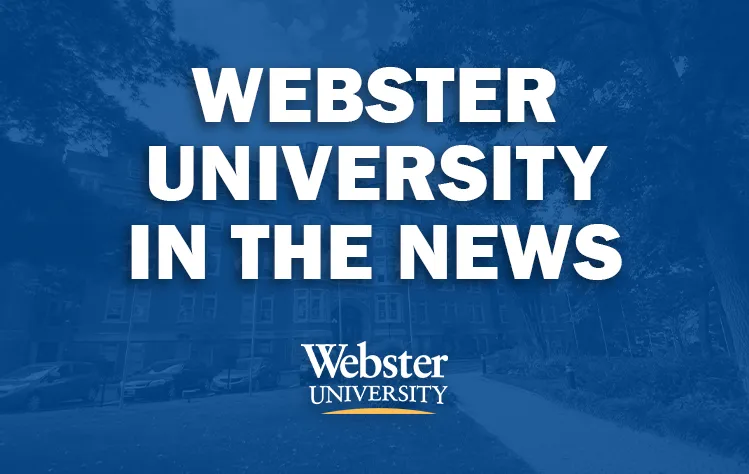
December 15, 2025

November 4, 2025
October 13, 2025
Webster University faculty and staff highlights offer a roundup of recent Webster faculty and staff activity and achieve...